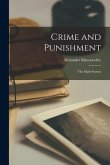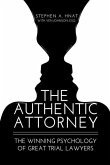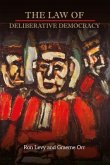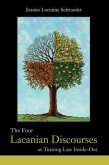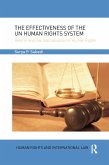Psychology in the Courts
Herausgeber: Corrado, Raymond R.; Roesch, Ronald; Dempster, Rebecca
Psychology in the Courts
Herausgeber: Corrado, Raymond R.; Roesch, Ronald; Dempster, Rebecca
- Broschiertes Buch
- Merkliste
- Auf die Merkliste
- Bewerten Bewerten
- Teilen
- Produkt teilen
- Produkterinnerung
- Produkterinnerung
This book provides a useful overview of the latest research into the interaction between psychology and the courts. Leading scholars and practitioners review recent research and practice in a number of principal areas: * adolescents in the legal system * the role of juries * competency to stand trial * conditional release * eyewitness evidence and testimony * the role of the victims.
Andere Kunden interessierten sich auch für
![Crime and Punishment: The Mark System Crime and Punishment: The Mark System]() Alexander MaconochieCrime and Punishment: The Mark System16,99 €
Alexander MaconochieCrime and Punishment: The Mark System16,99 €![The Authentic Attorney: The Winning Psychology of Great Trial Lawyers The Authentic Attorney: The Winning Psychology of Great Trial Lawyers]() Stephen A. HnatThe Authentic Attorney: The Winning Psychology of Great Trial Lawyers14,99 €
Stephen A. HnatThe Authentic Attorney: The Winning Psychology of Great Trial Lawyers14,99 €![Commentaries On the Causes, Forms, Symptoms, and Treatment, Moral and Medical, of Insanity Commentaries On the Causes, Forms, Symptoms, and Treatment, Moral and Medical, of Insanity]() George Man BurrowsCommentaries On the Causes, Forms, Symptoms, and Treatment, Moral and Medical, of Insanity33,99 €
George Man BurrowsCommentaries On the Causes, Forms, Symptoms, and Treatment, Moral and Medical, of Insanity33,99 €![The Judicial Politics of Economic Integration The Judicial Politics of Economic Integration]() Osvaldo SaldiasThe Judicial Politics of Economic Integration31,99 €
Osvaldo SaldiasThe Judicial Politics of Economic Integration31,99 €![The Law of Deliberative Democracy The Law of Deliberative Democracy]() Ron LevyThe Law of Deliberative Democracy68,99 €
Ron LevyThe Law of Deliberative Democracy68,99 €![The Four Lacanian Discourses The Four Lacanian Discourses]() Jeanne Lorraine SchroederThe Four Lacanian Discourses63,99 €
Jeanne Lorraine SchroederThe Four Lacanian Discourses63,99 €![The Effectiveness of the UN Human Rights System The Effectiveness of the UN Human Rights System]() OBE QC Subedi (Hon) Surya P.The Effectiveness of the UN Human Rights System63,99 €
OBE QC Subedi (Hon) Surya P.The Effectiveness of the UN Human Rights System63,99 €-
-
-
This book provides a useful overview of the latest research into the interaction between psychology and the courts. Leading scholars and practitioners review recent research and practice in a number of principal areas: * adolescents in the legal system * the role of juries * competency to stand trial * conditional release * eyewitness evidence and testimony * the role of the victims.
Hinweis: Dieser Artikel kann nur an eine deutsche Lieferadresse ausgeliefert werden.
Hinweis: Dieser Artikel kann nur an eine deutsche Lieferadresse ausgeliefert werden.
Produktdetails
- Produktdetails
- Verlag: Routledge
- Seitenzahl: 368
- Erscheinungstermin: 12. April 2013
- Englisch
- Abmessung: 229mm x 152mm x 20mm
- Gewicht: 533g
- ISBN-13: 9780415654005
- ISBN-10: 0415654009
- Artikelnr.: 36538667
- Herstellerkennzeichnung
- Libri GmbH
- Europaallee 1
- 36244 Bad Hersfeld
- gpsr@libri.de
- Verlag: Routledge
- Seitenzahl: 368
- Erscheinungstermin: 12. April 2013
- Englisch
- Abmessung: 229mm x 152mm x 20mm
- Gewicht: 533g
- ISBN-13: 9780415654005
- ISBN-10: 0415654009
- Artikelnr.: 36538667
- Herstellerkennzeichnung
- Libri GmbH
- Europaallee 1
- 36244 Bad Hersfeld
- gpsr@libri.de
Ronald Roesch, Raymond R. Corrado, Rebecca Dempster
Invited address; Part 1: Adolescents; 1: Toward an Expanded Definition of
Adolescent Competence in Legal Contexts; 2: Girls in Jail: Punishment or
Protection?; 3: Are Juveniles Getting a Fair Trial?: The Jury is Still Out;
Part 2: Juries; 4: Race and the Civil Jury: How Does a Juror's Race Shape
the Jury Experience?; 5: Juror Competence and Processing Style in Making
Sense of Complex Trial Information; 6: Effects of Criminal Motivation,
Ability, and Opportunity on Mock Jurors' Verdicts; Part 3: Civil and
Criminal Court; 7: Complex Medical Litigation and Hindsight Bias:
Strategies to Reduce Factfinders' Retrospective Attributions of Fault; 8: A
Comparison of American and Canadian Conceptualizations of Competence to
Stand Trial; 9: The Macarthur Competence Assessment Tool-Fitness to Plead:
Evaluation of a Research Instrument for Assessing Fitness to Plead; 10:
Public Opinion, Sentencing, and Parole: International Trends; 11: The
Syndrome Evidence Phenomenon: Time to Move On?; 12: Conditional Release
Attitudes: Laypersons' Perceptions of the Purposes, Effectiveness, and
Acceptability of Early Release by Offense Type 1; 13: Judges'
Decision-Making From Within; Part 4: Eyewitness Evidence and Testimony; 14:
Children's Recall of the Unfortunate Fakir: a Further Test of the Enhanced
Cognitive Interview; 15: Courtroom Pressures Can Alter Eyewitness
Confidence; 16: Creating Confusion: Unconscious Transference in Media Crime
Reporting; 17: The Discrimination of Deceptive, Mistaken, and Truthful
Witness Testimony; 18: Previous Exposure to the Sender's Behavior and
Accuracy at Judging Credibility; 19: The Influence of Personal
Characteristics, Stakes and Lie Complexity on the Accuracy and Confidence
to Detect Deceit 1; Part 5: Victims of Crime; 20: The Role of Social
Influence in Crime Victim's Decision to Notify the Police; 21: Structured
Trauma Writing (STW) as a Victim-Supportive Intervention: Examining the
Efficacy of Emotional Ventilation and Downward Writing 1
Adolescent Competence in Legal Contexts; 2: Girls in Jail: Punishment or
Protection?; 3: Are Juveniles Getting a Fair Trial?: The Jury is Still Out;
Part 2: Juries; 4: Race and the Civil Jury: How Does a Juror's Race Shape
the Jury Experience?; 5: Juror Competence and Processing Style in Making
Sense of Complex Trial Information; 6: Effects of Criminal Motivation,
Ability, and Opportunity on Mock Jurors' Verdicts; Part 3: Civil and
Criminal Court; 7: Complex Medical Litigation and Hindsight Bias:
Strategies to Reduce Factfinders' Retrospective Attributions of Fault; 8: A
Comparison of American and Canadian Conceptualizations of Competence to
Stand Trial; 9: The Macarthur Competence Assessment Tool-Fitness to Plead:
Evaluation of a Research Instrument for Assessing Fitness to Plead; 10:
Public Opinion, Sentencing, and Parole: International Trends; 11: The
Syndrome Evidence Phenomenon: Time to Move On?; 12: Conditional Release
Attitudes: Laypersons' Perceptions of the Purposes, Effectiveness, and
Acceptability of Early Release by Offense Type 1; 13: Judges'
Decision-Making From Within; Part 4: Eyewitness Evidence and Testimony; 14:
Children's Recall of the Unfortunate Fakir: a Further Test of the Enhanced
Cognitive Interview; 15: Courtroom Pressures Can Alter Eyewitness
Confidence; 16: Creating Confusion: Unconscious Transference in Media Crime
Reporting; 17: The Discrimination of Deceptive, Mistaken, and Truthful
Witness Testimony; 18: Previous Exposure to the Sender's Behavior and
Accuracy at Judging Credibility; 19: The Influence of Personal
Characteristics, Stakes and Lie Complexity on the Accuracy and Confidence
to Detect Deceit 1; Part 5: Victims of Crime; 20: The Role of Social
Influence in Crime Victim's Decision to Notify the Police; 21: Structured
Trauma Writing (STW) as a Victim-Supportive Intervention: Examining the
Efficacy of Emotional Ventilation and Downward Writing 1
Invited address; Part 1: Adolescents; 1: Toward an Expanded Definition of
Adolescent Competence in Legal Contexts; 2: Girls in Jail: Punishment or
Protection?; 3: Are Juveniles Getting a Fair Trial?: The Jury is Still Out;
Part 2: Juries; 4: Race and the Civil Jury: How Does a Juror's Race Shape
the Jury Experience?; 5: Juror Competence and Processing Style in Making
Sense of Complex Trial Information; 6: Effects of Criminal Motivation,
Ability, and Opportunity on Mock Jurors' Verdicts; Part 3: Civil and
Criminal Court; 7: Complex Medical Litigation and Hindsight Bias:
Strategies to Reduce Factfinders' Retrospective Attributions of Fault; 8: A
Comparison of American and Canadian Conceptualizations of Competence to
Stand Trial; 9: The Macarthur Competence Assessment Tool-Fitness to Plead:
Evaluation of a Research Instrument for Assessing Fitness to Plead; 10:
Public Opinion, Sentencing, and Parole: International Trends; 11: The
Syndrome Evidence Phenomenon: Time to Move On?; 12: Conditional Release
Attitudes: Laypersons' Perceptions of the Purposes, Effectiveness, and
Acceptability of Early Release by Offense Type 1; 13: Judges'
Decision-Making From Within; Part 4: Eyewitness Evidence and Testimony; 14:
Children's Recall of the Unfortunate Fakir: a Further Test of the Enhanced
Cognitive Interview; 15: Courtroom Pressures Can Alter Eyewitness
Confidence; 16: Creating Confusion: Unconscious Transference in Media Crime
Reporting; 17: The Discrimination of Deceptive, Mistaken, and Truthful
Witness Testimony; 18: Previous Exposure to the Sender's Behavior and
Accuracy at Judging Credibility; 19: The Influence of Personal
Characteristics, Stakes and Lie Complexity on the Accuracy and Confidence
to Detect Deceit 1; Part 5: Victims of Crime; 20: The Role of Social
Influence in Crime Victim's Decision to Notify the Police; 21: Structured
Trauma Writing (STW) as a Victim-Supportive Intervention: Examining the
Efficacy of Emotional Ventilation and Downward Writing 1
Adolescent Competence in Legal Contexts; 2: Girls in Jail: Punishment or
Protection?; 3: Are Juveniles Getting a Fair Trial?: The Jury is Still Out;
Part 2: Juries; 4: Race and the Civil Jury: How Does a Juror's Race Shape
the Jury Experience?; 5: Juror Competence and Processing Style in Making
Sense of Complex Trial Information; 6: Effects of Criminal Motivation,
Ability, and Opportunity on Mock Jurors' Verdicts; Part 3: Civil and
Criminal Court; 7: Complex Medical Litigation and Hindsight Bias:
Strategies to Reduce Factfinders' Retrospective Attributions of Fault; 8: A
Comparison of American and Canadian Conceptualizations of Competence to
Stand Trial; 9: The Macarthur Competence Assessment Tool-Fitness to Plead:
Evaluation of a Research Instrument for Assessing Fitness to Plead; 10:
Public Opinion, Sentencing, and Parole: International Trends; 11: The
Syndrome Evidence Phenomenon: Time to Move On?; 12: Conditional Release
Attitudes: Laypersons' Perceptions of the Purposes, Effectiveness, and
Acceptability of Early Release by Offense Type 1; 13: Judges'
Decision-Making From Within; Part 4: Eyewitness Evidence and Testimony; 14:
Children's Recall of the Unfortunate Fakir: a Further Test of the Enhanced
Cognitive Interview; 15: Courtroom Pressures Can Alter Eyewitness
Confidence; 16: Creating Confusion: Unconscious Transference in Media Crime
Reporting; 17: The Discrimination of Deceptive, Mistaken, and Truthful
Witness Testimony; 18: Previous Exposure to the Sender's Behavior and
Accuracy at Judging Credibility; 19: The Influence of Personal
Characteristics, Stakes and Lie Complexity on the Accuracy and Confidence
to Detect Deceit 1; Part 5: Victims of Crime; 20: The Role of Social
Influence in Crime Victim's Decision to Notify the Police; 21: Structured
Trauma Writing (STW) as a Victim-Supportive Intervention: Examining the
Efficacy of Emotional Ventilation and Downward Writing 1



